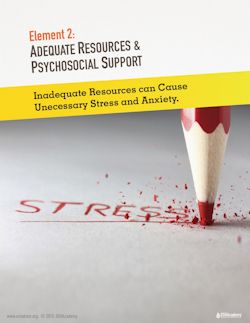S - Provide Psychosocial Support
Supervisors, more than anyone else, need to make sure the psychosocial environment promotes a safe and healthful workplace. The term, "psychosocial" relates to the interrelation of workplace social factors and how they influence employee thoughts, feelings, and behaviors.
Everything the employee experiences in the workplace has some effect on thoughts, feelings, beliefs, and actions. The psychosocial health of employees encompasses mental, emotional, and social well-being of employees. To gain a better idea about what we mean by the psychosocial environment, answer the following questions:
- Are supervisors creating undue stress when they prioritize working fast above working safe?
- Are employees more likely to have accidents when they're in a hurry?
- Are employees more likely to become ill or confrontational if they are working under high stress?
The answers to the questions above indicate the degree to which job stress is present in the workplace. Job stress can be defined as the harmful physical and emotional responses that occur when the requirements of the job do not match the capabilities, resources, or needs of the worker. Job stress can lead to poor health and even injury.
Factors that increase job stress include:
- Work demands: Work requires that employees work very fast, with intensity, have a high work load, work a lot of overtime, and are under constant time pressures. Supervisors should control these factors in a fair and objective manner.
- Job control: Workers have little control over the various aspects of their job such as scheduling, breaks, task variation, and very little opportunity to make their own decisions. Supervisors exhibit trust when they allow employees to make decisions that affect their jobs.
- Co-worker support: Supervisors and others offer very little help or are unwilling to listen to problems. Supervisors should regularly offer to help if employees are having problems.
- Management feedback: There is little opportunity to talk with supervisors and managers about the job. Supervisors should take the time to listen to employees and give regular feedback.
- Leadership: Supervisors and managers are overly controlling, coercive, or uncooperative. Supervisors and managers should exhibit high standards of personal tough-caring leadership. Accountability should be administered objectively and fairly.
- Physical stress: Supervisors need to control work to prevent high levels of fatigue, frustration, and lack of balance between home and work-life.
All of these situations affect the psychosocial environment in the workplace. Supervisors are responsible, to the extent possible, to ensure a workplace that is free from undue job stress.
Knowledge Check Choose the best answer for the question.
2-8. The term "psychosocial" relates to the interrelation of workplace social factors and how they influence employee _____.
You forgot to answer the question!

